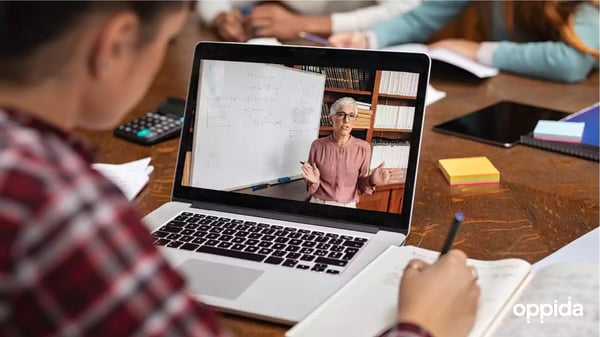Last month, I sat down with Jamie Engel, the CEO and Founder of Neutopia. We connected on LinkedIn...
Why is digital education not living up to its potential? (1)
2020 has been a pivotal year for digital education. The softly-softly migration to online learning took a dramatic turn this year, with the impacts of COVID propelling everyone into virtual learning environments at breakneck speeds. But while advances in technologies for virtual instruction and online course development offer great promise, unless the implementation challenges of digital education are fully understood and addressed, it may never quite live up to its full potential.

Earlier this year, Oppida embarked on a journey to develop a new brand strategy. It involved interviewing many of our customers and current team members about digital education (as well as discussing their dreams for Oppida). From these in-depth interviews and discussions, we compiled a list of reasons potentially blocking digital education from being as amazing as we believe it can be!
We will publish our list of perspectives in two parts. Please do tell us if you agree or disagree with any of them. A healthy discussion is always welcome!
-
Everyone is a beginner in this field. The industry is still in its infancy and ”quality” has not been properly defined.
For myself, as someone who built her first online course 10 years ago, this perspective did not automatically resonate. However, Oppida is meeting new clients every day who have worked in education for over 20 years but haven’t yet had to design a learning experience using technology. The reality is, many individuals and organisations have tried to avoid online learning for a multitude of reasons. Those who have embraced the digital world have often been lone rangers and not had the right financial or human resources support to produce quality.

-
For too long the underlying reason for making online education has been money–which has given rise to the development of poor quality materials.
In my opinion, this is totally on point. I would also take it a step further and say that the financial decision-makers are often out of touch with how much it actually costs to develop quality online education (or the skills it needs). Such decision-makers then can set unrealistic budgets and timeframes for the educators tasked to produce the product. Unlike delivering face to face, organisations have to invest upfront in the course development as they have to consider the lifetime of the ‘product’ as well as the costs to deliver it according to the desired student experience.

-
There is a deficit of good Learning Designers.
Yes, this is true as it is actually a relatively new profession. Sometimes called Instructional Designers, these individuals need to possess a magical combination of skills in order to support their organisations to lead in online. First and foremost, they must understand how people learn the fundamentals of good pedagogy. Then, they must be very comfortable with technology, innovative, great at stakeholder management (to work with different subject areas and experts). Then, in many situations, these unicorn-like individuals also must be able to project manage the course development.

-
Within higher education, educators are not specialists in online Learning Design.
Closely related to the above point, there has been too much reliance on the sink or swim strategy in regards to educators designing for online learning. There are too few specialists and too few educational opportunities that have the practical skills needed to re-think educational programs in the digital age. This is one particular area that Oppida is especially passionate about. Look out for Oppida Learning in 2021 as we launch a suite of courses designed for the educators on the front line being thrown in at the deep end!
It is becoming more apparent every day (even despite the pandemic circumstances) that the traditional global education system no longer fulfils our modern-day complex learning needs. Our present world takes huge transformative steps every nanosecond in one way or another. So, a new and modern way of education is needed to support and facilitate us in such a transformation. Yet, perhaps because of and in spite of the need to move online in response to COVID we are still not embracing all that digital education can offer.

We’ve shared our research and perspectives, but we’d love to hear your thoughts too! Get involved in the discussion and stay tuned for Part 2—where we outline the final five perspectives we’ve learned in our research.



